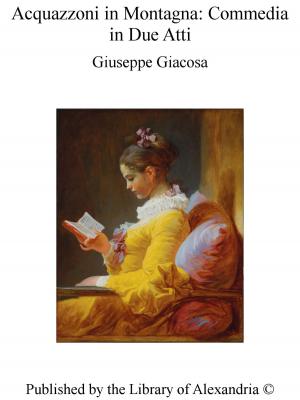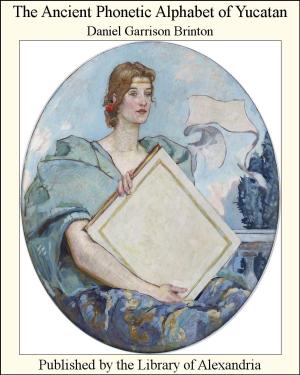Charles Tyrrell: The Bitter Blood (Complete)
Nonfiction, Religion & Spirituality, New Age, History, Fiction & Literature| Author: | George Payne Rainsford James | ISBN: | 9781465607232 |
| Publisher: | Library of Alexandria | Publication: | March 8, 2015 |
| Imprint: | Language: | English |
| Author: | George Payne Rainsford James |
| ISBN: | 9781465607232 |
| Publisher: | Library of Alexandria |
| Publication: | March 8, 2015 |
| Imprint: | |
| Language: | English |
Among all the many fine and beautiful figures and modes of reasoning that the universe in which we dwell has afforded for the illustration of the bright hope that is within us of a life renewed beyond the tomb, there is none more beautiful or more exquisite, that I know of, than that which is derived from the seasons; from the second life that bursts forth in spring in objects apparently dead, and from the shadowing forth in the renovation of everything around us of that after destiny which divine revelation calls upon our faith to believe shall yet be ours. The trees, that have faded and remained dark and gray through the long, dreary lapse of winter, clothe themselves again in green in the spring sunshine, and every leaf and every hue speaks of life. The birds that were mute sing again as tunefully as ever; the flowers that were trampled down and faded burst forth once more, in freshness and in beauty; the streams break from the icy chains that held them, and the glorious sun himself comes wandering back from his far journey, giving summer and warmth, and fertility and magnificence to everything around. All that we see breathes of the same hope; everything that we see rekindles into life. But, on the other hand, there are things within us that awake no more; there are feelings in our hearts that, passed away, return not; there are thoughts that can never be thought again: there are hopes that, once put out, are put out for ever. These are the things that speak to us of death! These are the things that would darken our hopes of immortality, were we not to draw from them inferences of a higher state of being, where love, and confidence, and happiness are not delusions; where the plant of enjoyment has not its root in the earth, and where the flowers of life wither not away. There are certainly changes in our very nature which would fill our bosoms with many dark and awful doubts, did we not find that, in the well-regulated mind, the bright and intoxicating dreams of early youth, the love that has been crushed or thwarted, the confidence that has been a thousand times betrayed, may give place to firmer and more solid things, feelings not so exquisite, but more deep and powerful; thoughts not so brilliant, but more just and true, did we not find that, with proper cultivation, the flowers made way for fruit; did we not find that every stage of existence would have, but for our own faults, its proper class of enjoyments, and that every stage but leads us on towards an appreciation of that last noblest state of being, for which all the rest are but a preparation. If we are immortal, is it not well that we should find earth's flowers fade? If we are immortal, is it not well that we should find earth's hopes deceive us? If we are immortal, is it not well that we should learn to regret the passing away of bright capabilities in our own nature, which are sure to be renewed extended, multiplied in heaven?
Among all the many fine and beautiful figures and modes of reasoning that the universe in which we dwell has afforded for the illustration of the bright hope that is within us of a life renewed beyond the tomb, there is none more beautiful or more exquisite, that I know of, than that which is derived from the seasons; from the second life that bursts forth in spring in objects apparently dead, and from the shadowing forth in the renovation of everything around us of that after destiny which divine revelation calls upon our faith to believe shall yet be ours. The trees, that have faded and remained dark and gray through the long, dreary lapse of winter, clothe themselves again in green in the spring sunshine, and every leaf and every hue speaks of life. The birds that were mute sing again as tunefully as ever; the flowers that were trampled down and faded burst forth once more, in freshness and in beauty; the streams break from the icy chains that held them, and the glorious sun himself comes wandering back from his far journey, giving summer and warmth, and fertility and magnificence to everything around. All that we see breathes of the same hope; everything that we see rekindles into life. But, on the other hand, there are things within us that awake no more; there are feelings in our hearts that, passed away, return not; there are thoughts that can never be thought again: there are hopes that, once put out, are put out for ever. These are the things that speak to us of death! These are the things that would darken our hopes of immortality, were we not to draw from them inferences of a higher state of being, where love, and confidence, and happiness are not delusions; where the plant of enjoyment has not its root in the earth, and where the flowers of life wither not away. There are certainly changes in our very nature which would fill our bosoms with many dark and awful doubts, did we not find that, in the well-regulated mind, the bright and intoxicating dreams of early youth, the love that has been crushed or thwarted, the confidence that has been a thousand times betrayed, may give place to firmer and more solid things, feelings not so exquisite, but more deep and powerful; thoughts not so brilliant, but more just and true, did we not find that, with proper cultivation, the flowers made way for fruit; did we not find that every stage of existence would have, but for our own faults, its proper class of enjoyments, and that every stage but leads us on towards an appreciation of that last noblest state of being, for which all the rest are but a preparation. If we are immortal, is it not well that we should find earth's flowers fade? If we are immortal, is it not well that we should find earth's hopes deceive us? If we are immortal, is it not well that we should learn to regret the passing away of bright capabilities in our own nature, which are sure to be renewed extended, multiplied in heaven?















